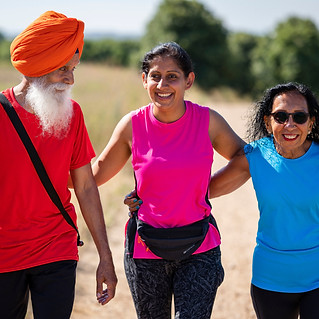
Quick guide to loneliness
If you're going to know six things, know these...
1. Loneliness is completely natural.
Most of us will experience loneliness at some point in our lives. Loneliness doesn’t mean there’s anything wrong with you – it’s your body’s way of letting you know that you’re not getting your social needs met. Consider it like a warning sign that you need to address your social needs - like hunger is a warning sign you need to eat.
2. Loneliness isn’t just something older people feel.
People aged 16-24 are now the most likely group to be affected by loneliness, while women and people from ethnic minorities were amongst the groups most affected by loneliness during the pandemic. 45% of adults in England (25 million people) say they feel occasionally, sometimes or often lonely.*
3. There are different types of loneliness.
Some loneliness is situational, where we might have moved to a new place or live somewhere where we don’t have the right level of connection. Loneliness can be linked to a specific life event like bereavement, a relationship breakdown or becoming a new parent. Workplace loneliness can be felt at work, if you are not getting the right level of connection. Emotional loneliness can happen in relationships and families, where you have people in your life but you don’t feel close to or understood by them. There is no ‘one size fits all’ to loneliness and more often than not, you won’t know someone is feeling lonely, unless they say.
4. Think about how you describe loneliness.
Very often it’s described as something we ‘suffer’ from and that we ‘admit’ to having. There is nothing to feel embarrassed or shameful about. Try swapping in ‘experience’ instead of suffering and ‘telling’ instead of admitting. Using kinder and more accepting language around loneliness will help to further remove the stigma. Or, if you’re feeling lonely and don’t feel comfortable saying it, you don’t have to explicitly name it. Try saying something like: ‘I feel like I need some more contact or company.’ This could also work if you feel someone is lonely but don’t know how to broach it and need a gentler way in.
5. Loneliness is fixable.
Often it can feel overwhelming and something that we will feel forever, but we can take immediate steps to feel better. Tell someone you trust how you’re feeling, think about what you need (we are all different) and make a plan to start getting those social connections you need. If you feel that loneliness is having a deeper detrimental impact on your life, reach out to a health professional.
6. Loneliness is not a mental health condition.
It is a normal human reaction when we’re not getting our social needs met. If left unchecked, loneliness can start to affect our mental and physical health but it’s important to know that first and foremost, it’s a normal and natural feeling. However horrible it can feel when you’re in it, there is always something you can do to feel better. Most loneliness is temporary.
*Statistics taken from the ONS, UCL Covid-19 Social Study and Campaign To End Loneliness.
.png)



.jpg)